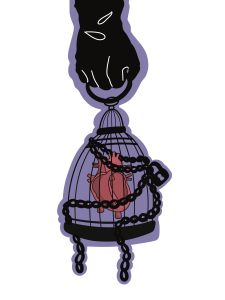
EDITOR’S NOTE: Millions of people experience some form of domestic violence every year. October is Domestic Violence Awareness Month, so a section of The Daily Mississippian is being devoted to events and resources available for individuals experiencing domestic violence. If you are the victim/survivor of domestic violence, please consider using the resources presented in this article.
Domestic violence is defined as the willful intimidation, physical assault, battery, sexual assault and/or other abusive behavior by one intimate partner against another in an attempt for control.
More than 10 million people in the United States are physically abused by an intimate partner, equating to roughly 20 people per minute.
Domestic violence can affect people of any age, economic status, sexual orientation, gender, race, religion or nationality. The frequency and severity of domestic violence can vary, but the one consistency is the drive for power and control over one partner.
One in four women and one in nine men experience severe intimate partner physical violence, intimate partner contact sexual violence and/or intimate partner stalking with impacts such as injury, fearfulness, post-traumatic stress disorder, use of victim services, contraction of sexually transmitted diseases, etc.
Some warning signs of abusers can be extreme jealousy, possessiveness, verbal abuse, extremely controlling behavior or forced sex or disregard of their partner’s willingness to have sex.
There is not one personality of an abuser, but abusers tend to display common characteristics. According to the National Coalition against Domestic Violence, an abuser often denies the existence or minimizes the seriousness of violence and its effect on the victim and other family members. Abusers may blame their violence on things such as drugs, alcohol or a “bad day.” The abuser may be someone with low self-esteem who feels powerless and ineffective, even though they may appear to be successful to the outside world.
Combating Domestic Violence
As domestic violence is becoming a more prevalent issue in society, different institutions and organizations are working to combat this type of violence.
Earlier this month, the University of Mississippi Medical Center was awarded two grants totaling $7.5 million to research causes and ways to reduce violence. Part of the research will focus on determining the main causes of Mississippi’s high rate of domestic violence. According to Mississippi Broadcasting, psychologists are interested in what interventions could be enacted to better protect victims.
Experts and domestic violence advocates are now pushing for routine patient screenings and conversations about relationships in a range of medical settings, including primary care and pre- and post-natal care.
“By screening for and identifying unmet social needs, providers are better positioned to serve their patients in a more holistic way — such as connecting patients experiencing interpersonal violence with community resources or services,” Chiquita Brooks-LaSure, Center for Medicare and Medicaid Services administrator for the Biden administration, said in an interview with Politico.
Gathering data can help develop solutions and promote more equitable care for “individuals, families and communities across the country,” according to Brooks-LaSure.
The Affordable Care Act, also known as Obamacare, has expanded its program to include home visits to at-risk pregnant women or families with babies. Although the visits typically address things like childhood health needs and parenting education, they can also detect and provide help for dangerous or abusive situations.
Domestic violence isn’t purely physical. Individuals who experience any form of domestic violence may also suffer mentally, emotionally or psychologically.
“Exposure to violence, including intimate partner violence, has a direct impact on mental and physical health outcomes and is directly tied to injury, psychological distress and death in all age groups,” Brooks-LaSure said.
Research from the World Health Organization concludes that intimate partner violence and sexual violence can “lead to depression, post-traumatic stress and other anxiety disorders, sleep difficulties, eating disorders and suicide attempts.” Women who have experienced intimate partner violence are also almost twice as likely to experience depression and drinking problems. In the most serious cases, domestic violence can lead to homicide or suicide.
The state of Mississippi hotline is 1.800.898.3234. The national hotline is 1.800.799.7233.
Resources at the University of Mississippi:
- Violence Intervention and Prevention: Survivor Support Services promotes awareness of sexual assault, intimate partner violence and stalking. They provide training for students, faculty and staff while assisting victim-survivors of these incidents.
- The Counseling Center provides counseling services, including individual and group sessions for diverse mental health concerns.
- Clinic for Outreach and Personal Enrichment (COPE) offers free mental health counseling to faculty, staff, students and members of the community.



























